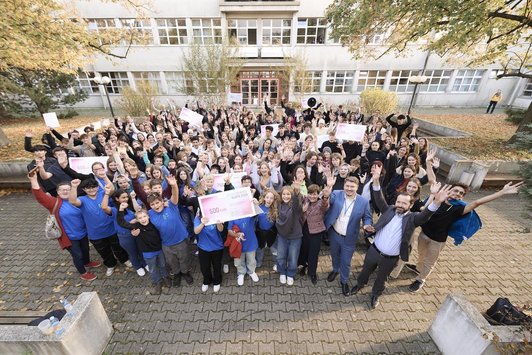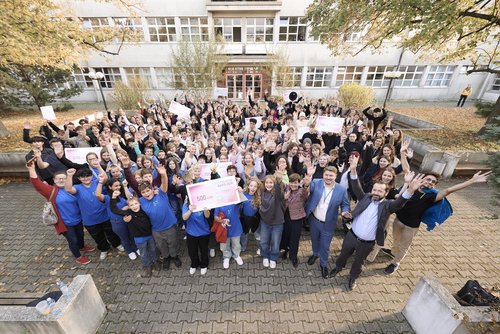More than 45,000 data sets for science: BMBWF and OeAD honour Citizen Scientists
What grows on our green roof? How sustainable is our food? Which words from the local dialect are still in use today? These are three of many research questions that citizen scientists were able to address in eight projects this time. Particularly dedicated citizen scientists were honoured by OeAD Managing Director Jakob Calice and Stefan Duscher, Senior Councillor at the BMBWF, at the 3rd Young Science Congress of Austria's Education Agency OeAD on 24 October 2024.
Young Science Congress 2024
Schools, families, individuals and, for the first time, youth groups were invited to immerse themselves in the world of science and research at the OeAD's Young Science Congress at the KPH Vienna/Krems, Strebersdorf campus. School classes and teachers were able to talk to researchers, actively participate in projects and learn more about research activities and the researchers themselves in workshops, a lecture and a science course. As a special highlight, particularly committed students, families and individuals were brought before the curtain at the award ceremony: they had participated in research in one of eight selected research projects and were honoured for this with the Citizen Science Awards. In addition, the winners of the Young Science Inspiration Award presented theses that had inspired researchers.
Presentation of the Citizen Science Award 2024
Every year from 1 April to 31 July, members of the public of all ages and from all sections of the population have the opportunity to experience science up close and personal and to make direct contact with researchers by taking part in the Citizen Science Award projects. This year, eight citizen science projects were offered for participation.
Federal Minister Martin Polaschek (BMBWF) was impressed by the great commitment of the lay researchers: ‘The dedication and participation of so many citizens in exciting research projects is inspiring! This year, over 2,900 people have taken part in research – including students from 119 school classes and many other dedicated citizens. Citizen science offers the opportunity to experience research up close and is therefore an important part of our departmental strategy for strengthening trust in science and democracy.’
The project involved transcribing dialect words, photographing how food is handled, creating educational videos about human papillomavirus, documenting the distribution of selected insects, researching biodiversity on green roofs, conducting interviews with scientists and analysing the effects of urban heat and extreme weather phenomena. More than 45,000 data sets are now waiting to be evaluated and analysed by the research teams. 23 schools, two families and six individuals who have been particularly active in the research have now been honoured for their commitment.
The following schools are among the winners:
From Vienna: HLTW 13 Vienna, GRG15 Schmelz, OMS Pfeilgasse, Diefenbachgymnasium, BRG6 and VS St.Ursula. From Styria: HLW FSB Weiz, HBLA for Forestry Bruck/Mur and BRG Keplerstraße. From Upper Austria: Adalbert Stifter Grammar School Linz, Weißenbach an der Enns Secondary Modern School, Linz College of Art, Eferding Higher College of Commerce, digiTNMS Scharnstein and HLK/HLW Freistadt. From Lower Austria: BG/BRG Tullnerbach – Wienerwald Grammar School, BG/BRG Stockerau, Perchtoldsdorf Grammar School and BG und BRG Gmünd.
From Salzburg: PdC BORG Radstadt, Holztechnikum Kuchl and WRG Salzburg. From Tyrol: RG Schwaz. The schools received prize money of up to 1,000 euros for the class fund from the BMBWF.
Winners in the categories ‘Individuals’ and ‘Families’:
From Carinthia: Rosemarie Maliha and Hannes Goldgruber. From Lower Austria: Florian Mayr, Johannes Reithner and Franz Zeiler and from Vienna Michael Kozlik. In the category ‘Family’ the winners were the Schuster family from Vienna and the Fügenschuh-Hrdlovics family from Tyrol. They received prizes in kind, donated by the respective projects.
Young Science Inspiration Award ceremony
The final of the Young Science Inspiration Award 2024 was female – four young women inspired scientists with their school theses. The finalists used the OeAD Young Science Topic Platform to find topics and got ideas from current research projects. Pupils who have used this platform can submit their completed work for the Young Science Inspiration Award by 30 April each year. With 46 valid submissions, there were more participants this year than ever before. Jakob Calice, managing director of the OeAD, was very impressed by this year's submissions: ‘An impressive 80 percent of the works contained an inspiring or innovative aspect for the researchers working on the respective topics. Every year, I am fascinated by how ambitiously and motivated young people can work on a topic and conduct research. Particularly with regard to future studies, these are valuable qualities that these students have already acquired.’
A jury selected two outstanding school-leaving theses (formerly known as pre-scientific theses) and one diploma thesis from all the nominations. These young people then had four minutes on stage at the Young Science Congress to convince the audience of their work and win the audience award. Julia Dunner and Carla Sark from the school HLTW 13 Bergheidengasse won the race – with their school diploma thesis on the topic ‘The imparting of financial knowledge to young people using the example of current criminal cases in the economy (Wire-card and FTX)’, they not only convinced a researcher from the FH Joanneum (Graz), but also the audience. In addition to the €300 that all finalists receive, they also received the €100 audience award. Unfortunately, Sarah Wallner (a former student at the BG/BORG St. Johann in Tyrol) was unable to attend the final due to illness. She will receive the €300 cheque by post.
Outlook
In 2025, people throughout Austria will once again be able to take part in exciting research projects at the Citizen Science Award. Cash prizes for the class fund and non-cash prizes for families and individuals await. The selected projects will be available on the Young Science website of the OeAD from February 2025.
And students who use the OeAD's Young Science topic platform for their final paper at an academic secondary school or for a diploma thesis can also submit their work for the Young Science Inspiration Award by 30 April.
Photos of the event:


